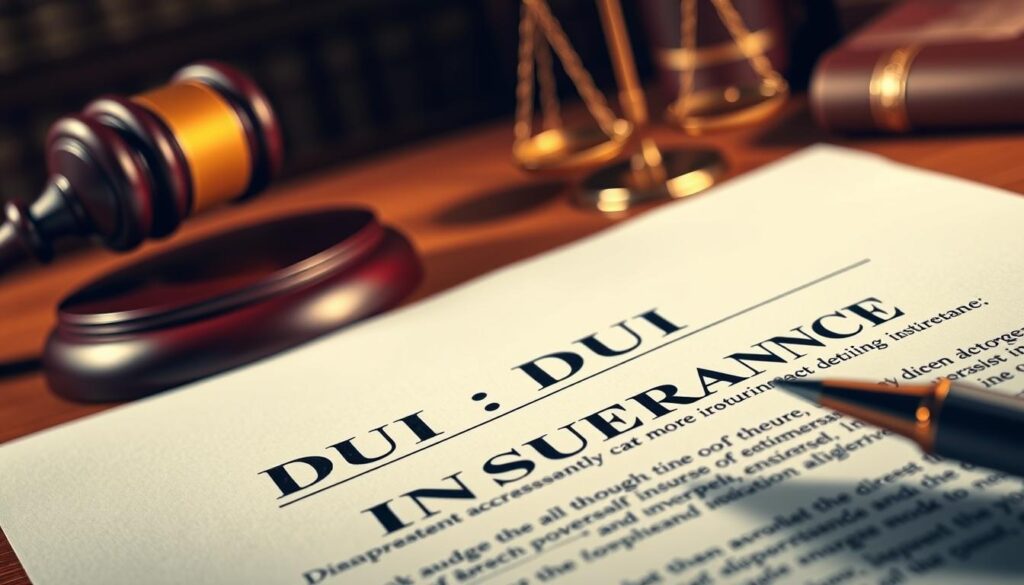Getting a DUI charge can be really stressful. It’s important to know how it affects your insurance.
Many people wonder if they must tell their insurance about the DUI before they’re officially convicted.
A DUI can really raise your insurance costs. It might even cause your policy to be canceled.
It’s crucial to know what you need to do and what might happen.
Key Takeaways
- Understanding the necessity of reporting a DUI to your insurance provider
- The potential consequences of a DUI on your insurance premiums
- How to navigate the situation effectively
- The importance of knowing your insurance policy’s terms
- Steps to take after receiving a DUI charge
Understanding DUI and Its Impact on Insurance Rates
Knowing how a DUI affects your insurance is key to managing your finances. A DUI, or Driving Under the Influence, is a serious crime. It can change many parts of your life, including your insurance.
What is a DUI?
A DUI means driving while drunk or on drugs. The legal limit for blood alcohol concentration (BAC) is 0.08% for adults. DUI laws are strict, leading to fines, license loss, and jail time.
DUI isn’t just about alcohol. It also includes driving under the influence of drugs. A DUI conviction can last a long time. It affects your driving rights and insurance costs.
How Do Insurance Companies View DUIs?
Insurance companies see DUIs as a big risk. A DUI conviction means you’re more likely to be in an accident. This makes your insurance more expensive.
To understand how insurance companies view DUIs, let’s look at a comparison:
| Factor | Impact on Insurance | Reason |
|---|---|---|
| DUI Conviction | Increased Premiums | Higher risk of accidents |
| Severity of DUI Offense | Varies | More severe offenses lead to higher rate increases |
| Driving History | Affects Rate Increase | Clean record may mitigate some increase |

Insurance companies look at many things, like the DUI’s severity and your driving history. Knowing these factors helps you understand how a DUI might change your insurance.
Reporting Requirements for Insurance Claims
Knowing how to report a DUI to your insurance is key. When you’re in a DUI accident, it’s important to report it right away. This helps avoid problems with your claims.
When Should You Report a DUI?
When to report a DUI to your insurance is very important. It’s best to tell them as soon as it happens. Quick reporting can stop issues with your insurance, like claims being denied because you were late.
Your insurance policy might ask you to tell them about any incidents that could lead to a claim. If you don’t report a DUI on time, you could face higher premiums or even lose your policy.

Differences in State Laws
State laws about reporting DUIs are different. Some states require you to report DUIs within a few days. Others might give you more time.
It’s vital to know your state’s laws on DUI reporting. Talk to your insurance agent or a lawyer to make sure you’re following the rules. This keeps you out of trouble and makes the insurance claims process smoother.
Being proactive and knowing the DUI reporting rules helps you deal with insurance claims better. It also makes sure you follow your insurance policy and state laws.
Timing: Reporting Before or After Conviction
When you get arrested for DUI, you might wonder when to tell your insurance. Should you report it before or after you’re convicted?

The Importance of the Timeline
Telling your insurance about a DUI quickly is key. Insurance companies need to know about any incidents that might lead to claims. If you don’t report a DUI, you could face severe consequences. This might include losing your policy or it not being renewed.
When to report a DUI varies by state and insurance company. But, it’s best to do it as soon as you can after the arrest or conviction. You should consider:
- The laws in your state about DUI reporting
- Your insurance company’s specific rules
- How it might affect your rates and coverage
Potential Consequences of Delayed Reporting
Waiting too long to report a DUI can cause big problems. If your insurance finds out you didn’t tell them, they might:
- Go back and raise your premiums
- Cancel your policy
- Not renew it
Delayed reporting can also lead to legal trouble. This is especially true if your insurance thinks you hid the DUI on purpose. So, knowing the importance of quick reporting and the risks of waiting is vital. It helps you manage how a DUI affects your auto insurance.
Consequences of Not Reporting a DUI
Not telling your insurer about a DUI can lead to big problems. It can cause financial and legal issues that could have been avoided if you had told them sooner.

Not reporting a DUI can cause many negative effects. The two biggest are higher insurance costs and legal trouble.
Increased Insurance Premiums
Not telling about a DUI can make your insurance costs go up a lot. If your insurer finds out you didn’t tell them, they might see it as a big deal. This could lead to your policy being canceled or your rates going way up.
Insurance companies look at many things to figure out how much to charge you. A DUI is seen as a big risk. So, they might charge you more. If you didn’t tell them about it, they might raise your rates or take other actions when they find out.
Legal Repercussions
Not reporting a DUI can also lead to legal trouble. In many places, not telling your insurance company what you should is against the law.
The legal trouble can be anything from fines to serious penalties. For example, if your insurance cancels your policy because you didn’t tell them, you might have to get SR-22 insurance. This is more expensive and is for drivers who are considered high-risk.
Also, if you have an accident or make a claim, not telling about the DUI can make things harder. It could even lead to your claim being denied or more legal problems.
How a DUI Affects Your Insurance Policy
It’s important to know how a DUI changes your insurance policy. A DUI can make your insurance more expensive and change its terms.
Policy Renewals and Underwriting
After a DUI, your insurance company will look at your risk again. This is called underwriting. They see you as a high-risk driver and raise your rates.
They might not renew your policy if they think you’re too risky. Then, you might have to get insurance from a high-risk provider. This is usually more expensive.
New Policy Applications
Getting a new policy after a DUI is harder. Insurers check your driving history closely. A DUI can mean higher rates or even denial of coverage.
Always tell the truth about your DUI when applying for a new policy. Not doing so can lead to policy cancellation or claim denial later. Being honest can help you find better and cheaper insurance.
Knowing about the DUI claim process and its effect on insurance is key. Being informed helps you make smart choices about your insurance. This can help lessen the financial hit from a DUI.
Communicating with Your Insurance Provider
When you face a DUI charge, talking to your insurance company is key. This talk can change how they handle your policy and any claims from the DUI.
Being open and clear about your DUI arrest is important. It’s not just about telling them about the arrest. It’s about giving them the full story so they can understand what happened.
Best Practices for Disclosure
To tell your insurance about the DUI, follow these steps:
- Be honest and share all the details about the DUI arrest.
- Tell them as soon as you can, maybe at policy renewal or when you file a claim.
- Know the laws in your state about reporting DUIs.
Insurance companies like it when you’re open about a DUI. But, how you share this info can depend on your insurer and state laws.
Questions to Ask Your Agent
When you talk to your insurance agent about the DUI, ask the right questions. This helps you understand how it will affect your policy. Some important questions are:
| Question | Purpose |
|---|---|
| How will this DUI affect my premiums? | Find out if your insurance costs will go up. |
| Do I need to report the DUI right away, or can it wait until policy renewal? | Make sure you know when to report it to avoid penalties. |
| Are there any extra things I need to do or give them? | Be ready with any documents or info they might ask for. |
Asking these questions helps you deal with the situation better. It makes sure you’re covered even with a DUI.

Talking well with your insurance and knowing what they need helps manage the DUI’s effect on your insurance.
Potential Benefits of Early Disclosure
Telling your insurer about a DUI early can make your relationship more open. By telling them about a DUI charge right away, you show honesty and take charge of your policy.
Transparency with Your Insurer
It’s key to be open about a DUI charge to keep a good relationship with your insurance company. Telling them early lets them understand the situation and guide you. This openness can bring many benefits, such as:
- Accurate Policy Adjustments: Your insurer can update your policy to fit your new situation.
- Prevention of Policy Cancellation: Not telling about a DUI can cause your policy to be canceled. Telling early avoids this risk.
- Better Communication: Being open helps you understand your policy better and any changes because of the DUI.
Building Trust for Future Claims
Being open about a DUI early also builds trust with your insurer. This trust is good for future claims. When you’ve been honest about big events like a DUI, your insurer sees you as responsible. This trust can lead to:
- Smoother Claims Processing: Being open about a DUI means your future claims will likely go smoother.
- Better Customer Service: Insurers tend to treat policyholders they trust better, which can help during claims.
By telling about a DUI early, you follow your insurance policy and make future claims easier. This forward-thinking can make your experience with your insurer better, even when things are tough.
What Happens After Reporting a DUI?
When you report a DUI, your insurance company starts a process. They look into what happened. This is key to figuring out how your insurance will change.
Investigation Process by Insurance Companies
Your insurance company will start an investigation after you report a DUI. They collect details about the incident. This includes what led up to the DUI, any legal actions, and the case’s outcome.
The investigation is a critical step for your insurance company. They use this info to decide if they should keep covering you. They might change your premiums or even cancel your policy. Experts say, “The insurer’s main worry is how serious the offense is and what it means for future risks.”
Possible Outcomes for Your Coverage
The investigation’s results can affect your insurance in different ways. Your insurer might:
- Keep covering you but raise your premiums because of the DUI.
- Change your policy terms, adding restrictions or exclusions because of the DUI.
- Cancel your policy if they think the risk is too high.
Consumer Reports notes, “A DUI can greatly increase your insurance rates. This effect can last for several years.” Knowing these possible outcomes helps you manage your expectations and make better insurance choices.
In summary, reporting a DUI starts an investigation by your insurance company. This can lead to different outcomes for your coverage. Understanding the DUI claim process and the DUI insurance consequences helps you deal with this situation better.
Factors Influencing Insurance Rates Post-DUI
Knowing what affects insurance rates after a DUI is key. When someone gets a DUI, insurance companies see them as higher risk. This can lead to higher premiums.
Insurance companies look at a few main things. They check how serious the DUI was and the person’s driving history. These things help figure out how much rates might go up.
Severity of the Offense
The seriousness of the DUI matters a lot to insurance companies. They look at the blood alcohol content, if there was an accident, and if kids were in the car.
A worse DUI, like one with a high BAC or an accident, will raise rates more. They see these as big risks for future claims.
Your Driving History and Risk Profile
Your driving record and risk level also play a big part. A clean record before the DUI might help keep rates lower. It shows you drive safely.
But, if you’ve had other DUIs or traffic tickets, rates will go up more. Insurance companies use special formulas to figure out your risk based on your driving history.
Knowing these factors can help you deal with insurance changes after a DUI. It’s important to talk to your insurance company. They can explain how these things affect you.
Steps to Minimize Future Insurance Costs
A DUI can raise your insurance rates. But, there are ways to lower them. By taking certain steps, you can reduce your insurance costs over time.
Defensive Driving Courses
One good way to lower insurance costs is by taking defensive driving courses. These courses show insurers you’re serious about safe driving. By doing this, you can get lower premiums.
Seeking Quotes from Multiple Insurers
It’s also smart to get quotes from many insurance companies. Rates can vary a lot, and some insurers might be more lenient about DUIs. By comparing rates, you can find the best deal.
| Insurance Provider | Rate After DUI | Additional Benefits |
|---|---|---|
| Provider A | 15% increase | Accident Forgiveness Program |
| Provider B | 20% increase | Defensive Driving Course Discount |
| Provider C | 10% increase | Multi-Policy Discount |
Comparing quotes and benefits from different providers helps you make a smart choice. Some insurers are better for high-risk drivers, like those with DUIs.
Conclusion: The Importance of Being Honest with Your Insurer
Telling the truth about a DUI charge to your insurance company is key. Not doing so can lead to big problems. It can make your insurance costs go up and even get you into legal trouble.
Key Points Recap
In this article, we talked about how a DUI affects your insurance rates. We also covered why it’s important to tell your insurer about a DUI. Knowing if you must report a DUI before conviction helps keep your relationship with your insurer strong.
Final Thoughts on DUI Insurance Consequences
Honesty is the best choice when it comes to DUI and insurance. Not telling your insurer about a DUI can cause your rates to rise and even lead to your policy being canceled. By being honest, you can avoid these issues and help keep your insurance costs down.

